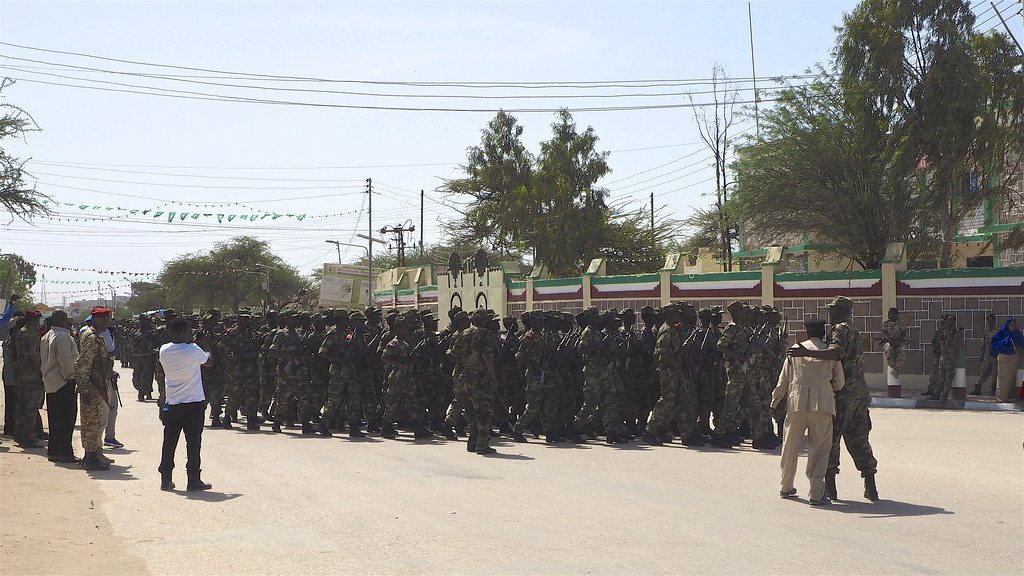The 2016 Somaliland Independence Day Parade in the capital Hargeisa.
To most, a functionally independent country that lies in the northern part of modern Somalia with a separate government, education system, and even a coast guard would be something out of a fantasy novel. However, Somaliland, hidden on the Horn of Africa, is exactly that. Its four million people declared independence in 1991—the second time they have done so since the colonial period—and have established a robust democracy that has seen peaceful transfers of power between political rivals in 2002 and 2010. Given that it is as large as Uruguay in terms of area, Somaliland clearly has the population, land, and democratic stability to be considered an autonomous nation by the international community. However, no country currently recognizes Somaliland’s sovereignty.
The main factors holding Somaliland back from full international recognition stem from its complicated history with Somalia and existing relationships between global leaders and Somaliland’s troubled neighbor. Nonetheless, the country is making a strong case for itself by garnering huge international investments and maintaining a stable and robust democracy. It is now the duty of international powerhouses to recognize Somaliland for its progress and welcome it to the international community.
History Should not Govern the Future
The international community’s focus on Somaliland’s historical ties with Somalia is short-sighted and unfair. The two countries only unified in 1960, when the British and Italians finally decolonized the area. Shortly after unification, however, power was quickly centralized to the south in Mogadishu, the current capital of Somalia. Somalilanders’ anger at this new form of pseudo-colonialism perpetuated by Mogadishu boiled over in the 1980s when Somali President Siad Barre took violent control of the country. The nationalist leader lashed out against the northern part of the country by destroying 90 percent of Somaliland’s main city of Hargeisa, massacring an estimated 50,000 members of the country’s largest ethnic group. Somalilander freedom fighters finally ousted Somali forces from their territory in 1991 and subsequently declared independence for the second time.
Within two years of independence, Somaliland enjoyed its first democratic election and built a stable democracy, while Somalia plunged into turmoil resulting from the power vacuum left by Barre. As Somalis were tied up in the long Battle of Mogadishu, Somalilanders developed their economy and democracy. However, since 1991, few countries have helped Somaliland establish its international presence. The two countries’ historical ties with one another has made it difficult for the international community to separate diplomacy with Somaliland from that with Mogadishu. The United States specifically has not recognized Somaliland due to its belief that it would be too disruptive to the Somali government. Even though it seems imprudent to hamper Somaliland’s growth solely because of its history with its southern neighbor, the world continues to ignore what the Economist calls “East Africa’s strongest democracy.”
Where Somaliland is Headed
Major international actors like the United States have not recognized Somaliland’s sovereignty in order to avoid amplifying the political challenges that Mogadishu is facing. Global leaders fear that recognizing Somaliland would further delegitimize Somalia’s weak government. However, international powerhouses’ willingness to send active military to Somalia 30 years ago contrasts sharply with their refusal to recognize a fully independent and prosperous government today. Nonetheless, many countries have consulates in Hargeisa, Somaliland’s capital, such as Denmark and the United Kingdom. Furthermore, South Africa, Ethiopia, Djibouti, Belgium, United Kingdom, France, South Sudan, and Kenya all accept Somaliland passports as legitimate means of identification. However, without any formal state recognition and an envoy to the United Nations, Somaliland has very little international power.
While its diplomatic efforts have hit roadblocks, Somaliland is growing politically and financially at an unprecedented speed. Even without international support, Somaliland has been able to garner significant foreign investment, further proving that it deserves international recognition. In 2012, Coca-Cola invested in a $15 million bottling factory in suburbs of Hargeisa, which created hundreds of jobs for locals. Coca-Cola has committed to investing $15 million more in the Somaliland Beverage Company to support the factory’s maintenance. Furthermore, the Dubai-based ports operator DP World invested a startling $442 million into building a brand new port in the city of Berbera, which lies on the strategic intersection of the Red Sea and the Gulf of Aden.
The resilience of Somaliland’s economic development is remarkable. This economic vigor translates to the country’s commitment to democracy, with the 2017 presidential election serving as clear evidence. The United States, France, the United Kingdom, and the European Union all sent representatives to watch the successful presidential elections. It is not clear whether this political momentum will carry over into recognition by these world superpowers. However, Somaliland is evidently on the right path to international statehood. Thus, the responsibility clearly lies with countries like the United States to reward Somaliland for being a shining example of democracy, stability, and independence.
Image Credit: Flickr/Clay Gilliland
